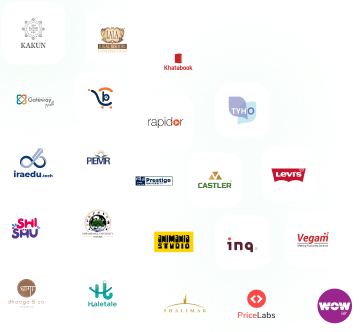Table Of Content
- Overview of WordPress
- Overview of React
- Feature Comparison Table between WordPress vs React :
- Ease of Use - WordPress vs React
- Customization and Flexibility - WordPress vs React
- Performance - WordPress vs React
- SEO Capabilities - WordPress vs React
- Pricing - WordPress vs React
- Conclusion: Which Should You Choose between WordPress vs React?
- FAQs: WordPress vs React
When deciding on a platform for your website or web application, two popular choices are WordPress vs React. WordPress is a robust content management system (CMS) used for creating all types of websites, while React is a JavaScript library used for building user interfaces, often for more dynamic, interactive websites and apps. This guide will break down the key differences and help you understand which is best suited to your project in 2025.
Overview of WordPress
WordPress is a highly popular open-source content management system (CMS) that powers more than 40% of websites globally. It offers an easy-to-use interface, themes, plugins, and an extensive community of developers. WordPress is particularly favored by bloggers, small businesses, and those looking to build websites quickly without needing much coding knowledge.
Key Features of WordPress:
Ease of Use: Built for users of all skill levels, with a simple admin interface.
Content Management: Best known for content creation, especially blogs and news websites.
Themes and Plugins: Thousands of pre-designed themes and plugins available.
SEO-Friendly: Built-in SEO features with plugins like Yoast SEO.
Scalability: Suitable for everything from small blogs to large enterprise websites.
Overview of React
React is an open-source JavaScript library developed by Facebook used for building user interfaces, particularly for single-page applications (SPAs) and dynamic web apps. React focuses on the "view" layer of applications, allowing developers to build interactive and highly dynamic interfaces. Unlike WordPress, React is not a CMS but a tool to build UIs and needs to be paired with other technologies to handle backend functionality.
Key Features of React:
Component-Based: Develop modular UI components that can be reused.
Declarative: React makes it easy to design interactive UIs by managing state and updating the view efficiently.
Fast Rendering: React uses a virtual DOM for fast, efficient updates and rendering.
Integration with Backend: Can be used with various backends like Node.js, Express, or custom APIs.
Highly Customizable: Full control over the application’s functionality and appearance.
Feature Comparison Table between WordPress vs React :
| Feature | WordPress | React |
|---|---|---|
| Type | Content Management System (CMS) | JavaScript Library (UI Framework) |
| Ease of Use | Beginner-friendly (with themes) | Requires coding knowledge |
| Customization | High (with plugins & themes) | Very High (full control) |
| Performance | Can be slower with plugins | Highly optimized and fast |
| SEO | Excellent (with plugins like Yoast SEO) | SEO needs custom setup |
| Security | Depends on plugins and hosting | Must be handled by developers |
| Learning Curve | Low (easy to start) | High (requires JavaScript & JSX knowledge) |
| Best For | Blogs, eCommerce, simple websites | Dynamic web apps, SPAs |
| Pricing | Free (with hosting costs) | Free (but requires backend & infrastructure) |
| Backend Handling | Built-in (via plugins like WooCommerce) | Requires external backend (Node.js, Firebase, etc.) |
Ease of Use - WordPress vs React
WordPress:
WordPress is known for its user-friendly interface. It allows even non-developers to create websites with ease, using pre-designed themes and drag-and-drop page builders. Managing content, including text, images, and blog posts, is straightforward. You can install plugins for extended functionality without writing any code.
Pros:
Easy to use with minimal technical skills
Large community and tons of resources
Many ready-made themes and plugins
Cons:
Can become complex when scaling or customizing beyond basic needs
Performance can be slow with too many plugins
React:
React, being a JavaScript library, is not as beginner-friendly as WordPress. Developers need to understand JavaScript, JSX (React's syntax extension), and other frontend development concepts. Building an application with React is more code-intensive and requires knowledge of frontend tools, libraries, and possibly backend integration.
Pros:
Great for building dynamic, interactive UIs
Full control over website functionality
Fast and scalable for large apps
Cons:
Requires significant technical skills
Steeper learning curve for non-developers
Winner: WordPress (for ease of use)
Customization and Flexibility - WordPress vs React
WordPress:
WordPress is highly customizable, especially with thousands of available plugins and themes. You can change your site's appearance and functionality with little coding knowledge. However, for highly specific customization, you may need to dive into code or hire a developer.
Pros:
Extensive library of plugins for added functionality
Custom themes for any niche or industry
Supports custom code integration
Cons:
Heavy use of plugins can impact performance
Limited flexibility for highly unique web applications
React:
React provides full control over your website’s functionality and design, but that comes with the responsibility of writing all the code yourself. If you need highly specific features, React allows you to build them from scratch. React’s component-based structure makes it easy to break down a complex interface into smaller, reusable parts.
Pros:
Complete freedom and flexibility for developers
Can be used with any backend
Excellent for building highly dynamic, interactive sites
Cons:
Requires time and coding skills to build and customize
Winner: React (for full customization and flexibility)
Performance - WordPress vs React
WordPress:
WordPress websites can be fast, but performance depends heavily on hosting quality, theme choices, and the number of plugins installed. Too many plugins or a poorly optimized theme can slow down the site. Caching plugins and content delivery networks (CDNs) can help improve performance.
Pros:
Can be fast with proper optimization
Easy to add caching and performance-enhancing plugins
Cons:
Performance can degrade with too many plugins
Not as optimized out of the box for complex or dynamic sites
React:
React is incredibly fast, thanks to its virtual DOM that minimizes direct interactions with the real DOM, ensuring efficient updates and rendering. React is highly optimized for performance, making it ideal for applications that require frequent user interaction and dynamic content.
Pros:
Fast performance, especially for SPAs
React’s virtual DOM optimizes rendering and updates
Cons:
Performance can still be impacted by poor backend or API setup
Winner: React (for performance)
SEO Capabilities - WordPress vs React
WordPress:
WordPress is SEO-friendly out of the box and has powerful plugins like Yoast SEO that can help you optimize your content. With these plugins, you can easily edit meta titles, descriptions, and ensure your content is optimized for search engines. WordPress also provides SEO-friendly permalinks and custom URL structures.
Pros:
Excellent SEO features with plugins like Yoast SEO
Easy to optimize on-page SEO
Cons:
Limited control over more complex SEO tasks
React:
While React can be SEO-friendly, it requires extra setup. React websites are rendered in the browser, meaning search engines may not index dynamic content properly. To solve this, developers often use server-side rendering (SSR) or static site generation (SSG) frameworks like Next.js or Gatsby to make React websites SEO-friendly.
Pros:
Full control over SEO structure
Can integrate with SSR/SSG for better indexing
Cons:
Requires extra setup for SEO
Client-side rendering can be a challenge for SEO
Winner: WordPress (for out-of-the-box SEO)
Pricing - WordPress vs React
WordPress:
WordPress itself is free, but you'll need to pay for web hosting (ranging from $3 to $30/month) and a domain name (typically $10–$20/year). If you want premium themes or plugins, those will add to the cost. Overall, WordPress can be affordable, but costs can increase depending on your needs.
Pros:
Free software
Affordable hosting and domain options
Cons:
Costs can add up with premium themes, plugins, and hosting
React:
React is free, but it’s not a standalone platform. You'll need to set up hosting, a backend server (like Node.js or Firebase), and possibly integrate it with a content management system (CMS). Development costs are higher since React requires coding expertise.
Pros:
Free to use
Full control over infrastructure
Cons:
Requires developers for setup and maintenance
Backend costs can add up
Winner: WordPress (for cost-effectiveness)
Conclusion: Which Should You Choose between WordPress vs React?
| Criteria | Best Choice |
|---|---|
| Ease of Use | WordPress |
| Customization | React |
| Performance | React |
| SEO | WordPress |
| Cost | WordPress |
| Scalability | React |
Final Verdict on WordPress vs React :
Choose WordPress if you need a quick, easy-to-manage website or blog with strong SEO capabilities, extensive themes and plugins, and minimal technical knowledge. Get in touch
Choose React if you're building a highly dynamic web application or SPA that requires fast performance, custom interactivity, and full control over the frontend development.
FAQs: WordPress vs React
1. Is React better than WordPress for SEO?
React requires extra steps for SEO, but with the right configuration (SSR or SSG), it can be optimized. WordPress, however, is more SEO-friendly out of the box.
2. Which one is more affordable: WordPress or React?
WordPress is more affordable for most use cases, as it’s free and has cheaper hosting options. React can incur higher costs due to the need for a custom backend and developer resources.
3. Is WordPress suitable for building web applications?
WordPress can be used for web applications, but is not as powerful as React for complex, highly interactive apps.
4. Can I use React for blogging?
While React can be used for blogging, it’s more commonly used for dynamic applications. WordPress is specifically built for blogging and content management.
Follow us on Facebook to know more about us.
The world’s First zero commission platform
Hire tech partners effortlessly
 If you're a non-tech founder looking for an agency or a tech founder looking for engineers.
If you're a non-tech founder looking for an agency or a tech founder looking for engineers. You can get your 5 best matches from 2800 in 5 mins, with 1000 data points tracked.
You can get your 5 best matches from 2800 in 5 mins, with 1000 data points tracked. Connect directly with no credit card needed!
Connect directly with no credit card needed!
You’re just a click away from the best talent.


